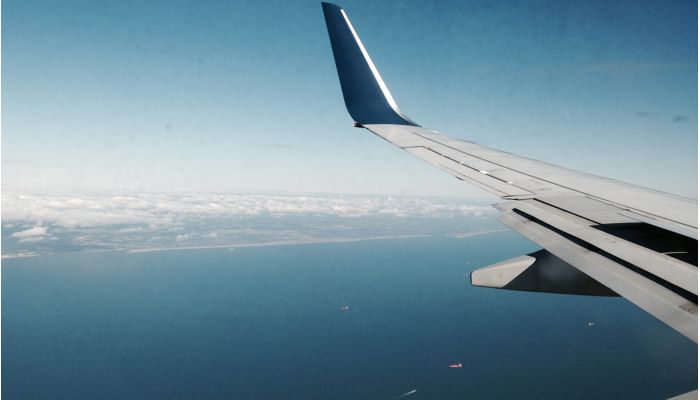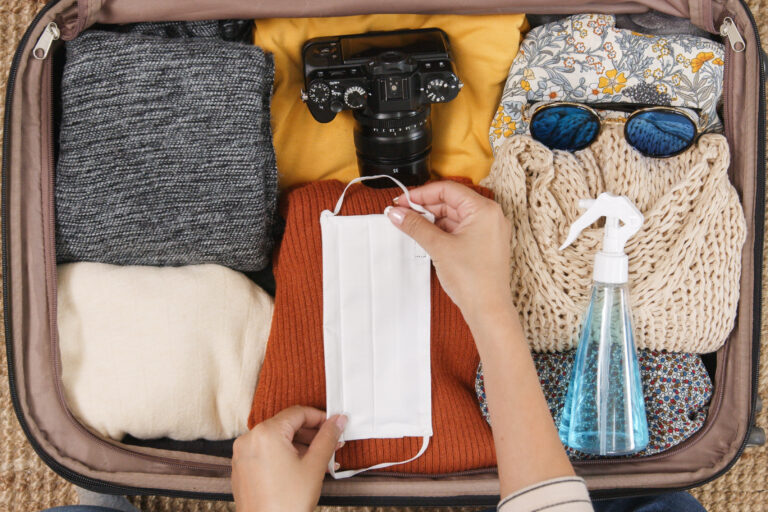Fall Travel Etiquette: 6 Ways to Stay Healthy While Traveling this Season

Autumn is approaching, and after months of isolation, many people are ready to resume exploring the world carefully. With vaccinations becoming more widespread, people are making plans to travel, whether to see beautiful fall colors, take advantage of travel deals or reunite with family after a long time apart. Fall travel etiquette is different in 2021, but you can reduce feelings of overwhelm by staying informed and following the latest CDC recommendations.
According to the CDC, fully vaccinated people can safely travel throughout the country and are less likely to get and pass along the virus. Americans are taking that to heart: a recent poll found that 80% of American travelers have made plans for a trip. But the reality is that even vaccinated people can get COVID-19 and either spread it or become ill. Even among vaccinated travelers, more than 63% are concerned about contracting the virus during travel.
While caution is necessary, there are ways to reduce risks and still enjoy your trip. Here are some seasonal tips to help you stay safe and healthy on your journey.
Fall Travel Etiquette:
Weigh the Risks
Fully vaccinated people (those who are at least two weeks past their final dose of the vaccine) have the green light to travel. But the potential dangers are greater for unvaccinated people, according to the CDC. If you’re not fully vaccinated, if you have other health factors that put you at a higher risk of severe illness, or if you live with someone who is at high risk, consider postponing your trip. You may also want to inquire about the vaccination status of those she will be staying with on your trip. It may be an awkward conversation, but one that is necessary.
Keep Necessities Handy
A fall travel etiquette tip that applies year round: make a travel kit of masks, hand sanitizer, tissues and disinfectant wipes. Keep it easily accessible at all times and use it frequently. Bring your own water bottle and snacks to help minimize contact with others. If you are staying in a hotel or a rental home, consider using disinfectant wipes to sanitize high-touch surfaces such as door handles, light switches, remote controls and bathroom fixtures. Don’t forget to disinfect the TV remote, which houses a multitude of germs.
Prepare For Your Journey
Understand what is required of you while traveling to your destination. Airlines and other forms of public transportation have mandatory mask requirements for passengers. Cruise ships serving the U.S. are once again open for business, with requirements such as proof of vaccination and negative COVID tests for passengers before embarking.
Study Up On Your Destination
Learn what’s going on at your travel destination. Are cases on the rise? What safety protocols are mandated? Things change rapidly, so have a current understanding of what to expect. Some destinations may require proof of vaccination, a negative COVID test or even quarantine upon arrival. Other attractions such as theme parks or museums may limit the number of visitors, requiring reservations or advance planning. Hard-hit locations such as Hawaii are now imposing new restrictions on travelers as COVID-19 cases and hospitalizations surge there. International travel comes with additional risks and requirements; check CDC recommendations regarding traveling abroad.
Care For You
In addition to the precautions you’re taking externally, focus on staying healthy. Do everything you can to look after your immune system so it can care for you. Eating nutritious food while traveling can be a challenge, but many fast-food restaurants offer at least one or two healthy options. Consider taking a good multivitamin as additional support. Getting plenty of rest and exercise should also be a priority. Traveling is generally pleasurable, but it’s also stressful, so do what you can to keep your mindset positive and your stress levels low.
Create a Contingency Plan
Think ahead to determine what you’ll do if you become ill while traveling. Catching COVID can lead to major consequences. Think ahead to the possibility of requiring medical care. Additionally, if you are exposed to the virus or become sick, you may be forced to extend your trip, causing you to miss work or other obligations. Have an emergency fund available; if you become infected, there will likely be costs in the form of itinerary changes and longer hotel stays due to the need to self-isolate. If you become ill while staying with friends or family, that will impact their lives as well.
By taking the right precautions, it’s possible to minimize the risk to yourself and those around you and explore the world safely and enjoyably.
For more information, check out The Protocol School of Texas. You may also like 2021 Travel Etiquette: Venturing Out For the First Time. For more of Diane’s etiquette tips, read her posts on Inc., subscribe to her articles on The Huffington Post, “like” The Protocol School of Texas on Facebook, and follow her on Pinterest, Instagram and Twitter.






